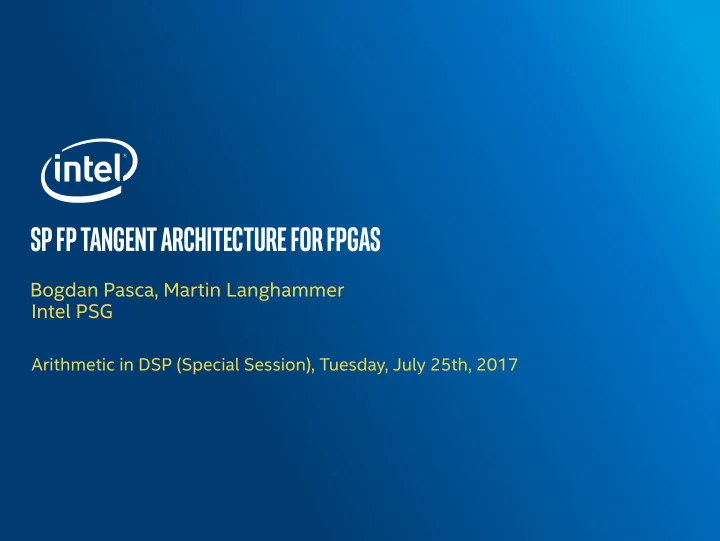

SPFPTANGENTARCHITECTUREFORFPGAS Bogdan Pasca, Martin Langhammer Intel PSG Arithmetic in DSP (Special Session), Tuesday, July 25th, 2017
This talk is about • single-precision tangent implementation • input range restricted to [ − π /2 , π /2] • accuracy can be tunned to meet OpenCL conformance • target contemporary FPGAs having hard FP DSPs • available in DSP Builder Advanced backend • this work builds on Faithful Single-Precision Floating-Point Tangent for FPGAs Field Programmable Gate Arrays 2013 (FPGA’13) Programmable Solutions Group Intel Public 2
• piecewise polynomial-approximation can also be used [6] better mapping to FPGA architecture can use operator assembly, but that can be wasteful [1, 5] • implementation as a fused-operator careful error analysis can obtain faithfully rounded SP tangent Context • many trigonometric function implementation use CORDIC [8, 3] efficient for iterative implementations unrolled implementations stressful on FPGA fabric multiple, deep, arithmetic structures with wide adders Programmable Solutions Group Intel Public 3
• implementation as a fused-operator careful error analysis can obtain faithfully rounded SP tangent Context • many trigonometric function implementation use CORDIC [8, 3] efficient for iterative implementations unrolled implementations stressful on FPGA fabric multiple, deep, arithmetic structures with wide adders • piecewise polynomial-approximation can also be used [6] better mapping to FPGA architecture can use operator assembly, but that can be wasteful [1, 5] Programmable Solutions Group Intel Public 3
Context • many trigonometric function implementation use CORDIC [8, 3] efficient for iterative implementations unrolled implementations stressful on FPGA fabric multiple, deep, arithmetic structures with wide adders • piecewise polynomial-approximation can also be used [6] better mapping to FPGA architecture can use operator assembly, but that can be wasteful [1, 5] • implementation as a fused-operator careful error analysis can obtain faithfully rounded SP tangent Programmable Solutions Group Intel Public 3
• tangent is symmetrical: tan tan range . is very small ( in SP), good approximation is tan • tan • 24+12=36 bit fixed-point for compute range input Technique y x − π π 2 2 • compute tan ( x ) with x ∈ [ − π /2 , + π /2] • range-reduction step not presented here [2, 7] Programmable Solutions Group Intel Public 4
is very small ( in SP), good approximation is tan • tan • 24+12=36 bit fixed-point for compute range input Technique �������������� �������������� �������������� �������������� �������������� �������������� y �������������� �������������� �������������� �������������� �������������� �������������� �������������� �������������� �������������� �������������� �������������� �������������� �������������� �������������� �������������� �������������� �������������� �������������� �������������� �������������� �������������� �������������� �������������� �������������� �������������� �������������� �������������� �������������� �������������� �������������� �������������� �������������� �������������� �������������� �������������� �������������� �������������� �������������� �������������� �������������� �������������� �������������� �������������� �������������� �������������� �������������� x �������������� �������������� �������������� �������������� �������������� �������������� − π π �������������� �������������� 2 2 �������������� �������������� �������������� �������������� �������������� �������������� �������������� �������������� �������������� �������������� �������������� �������������� �������������� �������������� �������������� �������������� �������������� �������������� �������������� �������������� �������������� �������������� �������������� �������������� �������������� �������������� �������������� �������������� �������������� �������������� �������������� �������������� �������������� �������������� �������������� �������������� �������������� �������������� �������������� �������������� �������������� �������������� �������������� �������������� �������������� �������������� �������������� �������������� �������������� �������������� • compute tan ( x ) with x ∈ [ − π /2 , + π /2] • range-reduction step not presented here [2, 7] • tangent is symmetrical: tan ( − x ) = − tan ( x ) → range = [0 , π /2) . Programmable Solutions Group Intel Public 4
Recommend
More recommend